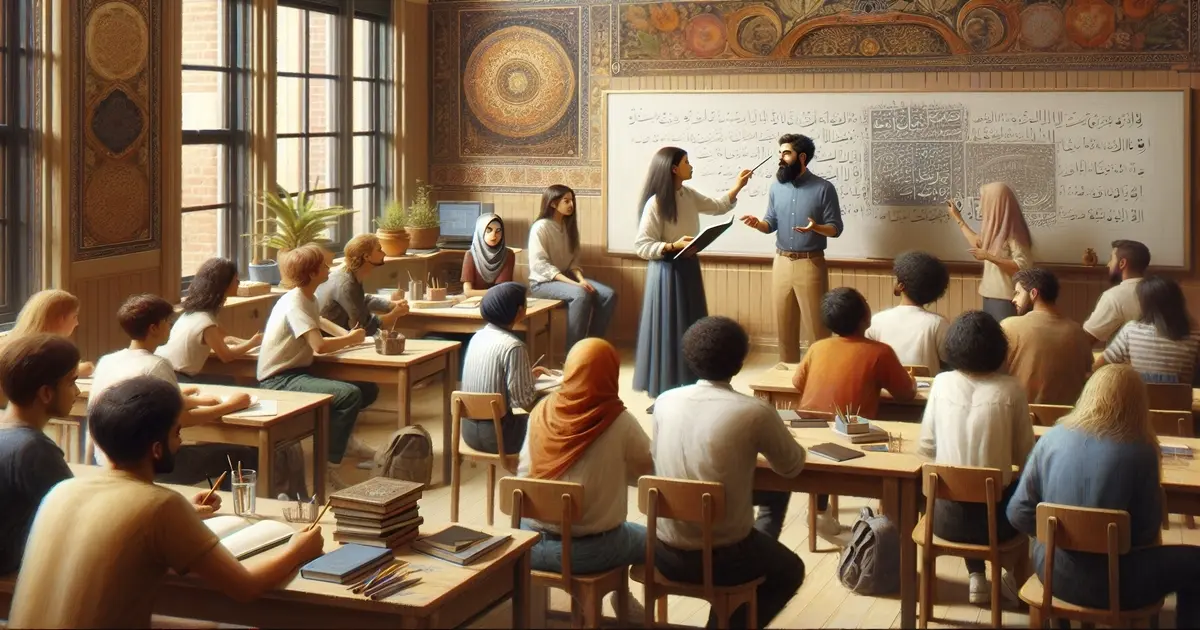Learn from Others: Boost Personal & Professional Growth
Discover effective ways to learn from others for personal and professional growth. Learn from real experiences, not just theories.

Learning from others involves gaining new skills, ideas, and wisdom. You can start this process simply by seeing or learning about what someone else has done.
Daily, folks all across the U.S. Retell these stories and swap this advice. They continue to collaborate and expand upon one another's work in schools, workplaces, and neighborhoods.
This makes it much easier to identify successes, avoid failures, and discover innovative solutions to challenges. The following sections elaborate on what this looks like in practice.
" Learning from others involves gaining new skills, ideas, and wisdom. "
Key Takeaways
- Social learning is more than just mimicry; it's a process by which we can all benefit from reflecting on and adopting lessons learned from others' actions and outcomes.
- Seeing what has worked for others, as well as what has failed, can help you identify the most effective strategies and avoid the pitfalls that have proven most detrimental.
- When a habit or skill is best learned through hands-on experience, it is more efficient to learn from mentors, colleagues, and vibrant, engaged online communities.
- The brain isn't simply wired for social learning, relying solely on pure observation, emotion, and feedback.
- When you ask the right questions and actively solicit constructive criticism, social learning becomes more powerful and meaningful.
- Overcoming hesitation to engage with others and choosing positive role models are crucial steps in maximizing the benefits of social learning opportunities.

What Exactly Is Social Learning?
Social learning is more than just imitation or mimicking an action performed by another. At the heart of it, folks learn new skills, habits, or concepts. They are active learners and avoid being naive by learning through observation and reflecting upon their actions.
This type of learning is prevalent in schools, workplaces, and communities nationwide. Community social learning theory, informed by leaders like Albert Bandura, examines how people behave and feel. It demonstrates how our environment and internal world shape what we learn.
1. More Than Simple Mimicry
Social learning is more than simply mimicking another's action. Children will imitate a mother or father putting on shoes. Authentic learning occurs as they watch, retain information, practice on their own, and have a desire to perform well.
These four processes—attention, retention, motor reproduction, and motivation—are at the core of the modeling process. For adults, this could involve figuring out how to facilitate a meeting after witnessing a colleague successfully and effectively doing so.
2. The Power of Observation
Individuals can learn just by observing those around them. This can happen in a matter of seconds, with no one having to train or receive a reward in the immediate future.
For instance, new hires often observe experienced staff to learn professional norms, even before participating in structured training. In animals, this mode of learning is commonly associated with ecological signals, such as a puppy learning from adult dogs.
3. Insights from Others' Success
When practitioners observe their peers succeeding, they learn about the practical approaches that work. They save these lessons as pictures or text, ensuring smoother application in the future.
In the workplace, when one person closes a major deal, it not only motivates others but also teaches them what successful behaviors look like.
4. Wisdom from Others' Setbacks
There's equally as much to learn from observing failures. A person witnessing a colleague's method not work out is less likely to make the same mistake.
This informs decisions without needing you to repeat the same mistake.
5. Our Innate Social Learning
We have a natural disposition toward social learning. Early on, children learn to read social signals through the observation of caregivers and educators.
This intimate change focuses on the environment and the human mindset. Social learning is continuous, not discrete, dynamic, and not merely passive.
Big Wins from Learning Socially
Social learning has a profound impact on individual and organizational development, performance, and decision-making. It extends far beyond the walls of our schools. In truth, learning socially from others lies at the very core of human and animal cultures, empowering us to grow and adapt.
Research in educational psychology and behaviorism has uncovered an amazing truth. Learning socially through observation is one of the most potent ways people learn. In the United States, this is particularly true in our classrooms, workplaces, and increasingly on social media platforms. When everybody learns socially, they don't just get what they asked for.
Level Up Your Career
In the workplace, social learning provides employees with a competitive advantage. Watching experienced coworkers or participating in group projects enables individuals to learn tools and systems at a faster and more efficient pace, thereby enhancing their productivity and effectiveness.
Consider how a new employee might learn to use company software — likely by shadowing an experienced user, not by studying the instruction manual. In innovation clusters like those of Los Angeles, peer mentorship is the norm, enabling individuals to exchange advice on best practices for coding or project management.
This approach mirrors real-world studies, where top-performing strategies relied on observing others, sometimes almost exclusively, to stay ahead in their field.
Boost Personal Development
Creating opportunities for personal development occurs when individuals witness another person's journey and shift their trajectory. Talking with a friend about how they handle stress or watching how a peer manages their time often sparks new habits.
Social learning aligns well with research from developmental psychology, which suggests that children acquire language and social norms through the process of imitation. What adults still do, though, is continue learning through observation by seeing what other people do and what works for them.
Sidestep Common Blunders
Learning socially helps individuals avoid common mistakes. For example, when an individual observes a colleague facing difficulty completing a project, they have a clearer understanding of what not to do.
In these big tournaments, agents who learned socially made better decisions and avoided key blunders. Sometimes, folks encounter behaviors they're already familiar with, so not every teaching moment is a revelation. Open storytelling about failures as a cohort helps to sharpen everyone's collective sword.
Build Smarter Habits Faster
Social learning builds smarter habits faster. This is evident in environments such as fitness classes, where working out with a group encourages participants to work harder.
In these digital environments, Americans are more likely to enter virtual communities to learn how to study better or cook a new recipe. Even when failures occur, studies indicate that social learning tactics endure—failures won't undermine collective achievement.

How Your Brain Processes It
Collaboration through peer-to-peer knowledge sharing is essential to how Americans learn new skills. This principle applies to people everywhere else in the world as well. The brain sorts these lessons through three main steps: encoding, storage, and retrieval.
When a person observes their best buddy repairing a bike, their brain is recording the procedures and saving the information. Later, when called upon, it retrieves this information faster than you could ever imagine. To reach real expertise, you need a detailed and highly structured mental model of a topic.
It's not enough to know the facts—it's about learning how those facts relate to one another. It's teachers and mentors with profound content knowledge who purposefully cultivate this process. They both give essential information and evaluation, both of which are central to the learning process.
The "Monkey See" Brain Cells
Imitation is an important, even intrinsic, part of American culture. Children learn that sort of slang on the playground, while chefs learn new techniques like that in Los Angeles restaurants. This is where the brain's unique "monkey see" brain cells—mirror neurons—come into play.
They activate when a person imitates the actions of another, such as learning guitar chords by observing a friend's fingers. This type of learning is known as observational learning. It activates essential brain areas such as the anterior cingulate cortex (ACC) and basolateral amygdala (BLA).
Yet, it doesn't travel through heredity—it moves between people through social networks, creating culture and social norms.
Reading Others' Intentions
That's because your brain is constantly trying to read the room. Even when passively observing another's labor, the medial prefrontal cortex (mPFC) recalibrates our predictions of their actions. It relies on signals from the ventral striatum, which monitors errors and unexpected events.
This allows people to adjust quickly, whether picking up a new tool at work or observing how a neighbor handles a problem. Mirroring occurs unconsciously, even when we are unaware of it.
Emotional Cues in Learning
Emotional cues play a crucial role in the social learning process. The ACC and BLA are part of the brain's system for detecting and responding to other people's emotions. For instance, your friend's enthusiasm can help a lesson resonate!
Classical conditioning, in which one associates a stimulus with a response, influences how individuals learn through observation and experience. Learning from one another fosters trust accelerates progress, and maintains the flow of information and knowledge within the community.
Practical Ways To Learn Socially
Engaging in peer-to-peer learning isn't just about duplicating models that you see as having success. Social learning theory, pioneered by psychologist Albert Bandura, reveals a fascinating secret. What do we learn from this? People are great at learning skills and habits through observation and imitation.
It's not enough to wait and see what emerges, but to actively notice how positive reinforcement or negative consequences help determine what is retained. Mirroring is an essential process through which people develop empathy and social connection. The message begins in infancy and is compounded by interactions with peers, family, friends, and eventually coworkers.
Identify Your Real-Life Gurus
Identifying real-life gurus to learn from is crucial in a school setting, which can involve pairing with peers who are critical thinkers or excellent communicators. At the office, it may be the colleague who always keeps their cool under pressure or the boss who provides constructive criticism.
These are your "real-life gurus," and they're paving the way and raising the bar. By observing how they approach basic tasks, you receive an in-the-flesh blueprint for development.
Actively Observe and Analyze
Actively observe and analyze. Don't be passive—learn to take notes on what everyone does and how they do it. Notice what makes for successful outcomes on collaborative assignments in the classroom.
Don't forget to observe how teams collaborate in the office as well! Classroom debates and group work build skills by allowing you to see different approaches to solving problems and discussing ideas.
Ask Better Questions Now
A simple yet powerful technique to accelerate this learning is to commit to asking better, open-ended questions. Facilitated discussions move beyond the "what" to uncover the "why" and "how" behind decisions.
This creates a discipline of clear thinking and the ability to learn from failure.
Practice What You See
Practice what you see and learn from those around you. This may facilitate a discussion among students. It could mean addressing a problematic section of a team project or adopting a new method for interacting with team members.
Practice makes these skills second nature.
Seek Constructive Feedback
Please review constructive feedback from peers whom you respect. This not only helps you identify blind spots or gaps, but it also ensures you are moving in the right direction.
Constructive feedback from peers, teachers, or mentors is what helps to make that effort into tangible improvement.

Beyond Watching: Connect Deeply
Approaching learning from others extends beyond the idea of simply watching someone do something exceptionally well. Authentic trust in true learning occurs when you engage in and collaborate with others, establishing confidence in the process. This is where collaborative learning makes all the difference.
It's not just about the technology; it's about people, often with different skill sets, collaborating, asking new questions, and telling new stories. This type of deep, experiential learning isn't limited to a classroom or even a coffee shop. It's more than just the data.
It's all about getting into the minds of the audience and understanding what drives their decisions.
Find Mentors Who Inspire
Mentors are valuable resources beyond their advice. Through their struggles and subsequent wins, they provide the roadmap for what's possible. For instance, a mentor in the technology field can show you how to approach a challenging issue.
They can also provide further instructions on how to recover from a botched rollout. In Los Angeles, creative fields are built on mentorship. These mentors have spent time in the field, understand the culture, and recognize the hidden curriculum.
Great mentors don't just provide the answers—they ask the questions that lead you to discover the right solution. They challenge you to develop your intellectual framework. This is not the world of all social media—this is a world where empathy and true listening count.
Culture and values—often shared ones—can have a profound impact on how these relationships function.
Learn With Your Peers
Peers play a crucial role in the learning process, especially during the teenage years. Engaging in collaborative projects, such as designing a new website or organizing a neighborhood event, provides young minds with valuable life lessons. This hands-on experience not only fosters learning but also encourages the development of social learning skills.
Through meaningful conversations, individuals discover innovative solutions and gain insights from one another. Participating in extensive group discussions with artists, planners, and activists broadens perspectives and enhances interpersonal development. This type of learning emphasizes being present, open, and receptive to new ideas, which is essential for successful people.
Ultimately, collaboration and interaction with peers create an enriching environment that nurtures creativity and problem-solving abilities. This approach to learning not only prepares kids for their professional lives but also strengthens their social relationships, equipping them to navigate various social situations effectively.
Join Helpful Communities Online
Groups on social media platforms remove the distance barrier, allowing you to connect easily with others who share similar objectives. In forums and group chats, you can ask clarifying questions and provide your expertise to help others.
It's relatively easy to engage in shallow, superficial exchanges on social media. You can forge genuine connections by being transparent, attentive, and responsive to people's concerns and needs.
Other online communities available in LA, such as those in the creative industry or tech, provide opportunities both virtually and in person, offering hybrid methods of accessing knowledge. These shared spaces bring together people from every background and the unlikeliest of partners, igniting new thinking and real change.
Common Hurdles (And How to Jump)
Learning from each other is challenging, even for experienced professionals. Each person faces hurdles that slow growth, like fear of asking, finding good role models, or knowing how much to follow. These struggles manifest whether a person is focused on advancing their career, developing personal relationships, or simply improving their overall life experience.
Below, let's examine some common hurdles and how to overcome them.
Beat the "Fear of Asking"
Many participants swallow their questions, afraid of being judged or feeling that their questions are too elementary. This fear can prevent expansion. In professional and educational contexts, the ability to ask is fundamental to learning and is particularly necessary when engaging with social learning platforms.
These tools, whether team chat apps or online forums, allow workers to learn from one another in the course of their everyday work. Innovative companies leverage them to enhance trust and collaboration.
Beat the "Fear of Asking." Confidence grows with practice. Developing public speaking skills, for example, helps people become accustomed to voicing their ideas and questions. Retraining posture, increasing breath control, and encouraging micro-movements all contribute to making performers feel more confident in these high-stakes situations.
Find Truly Inspiring Models
Choosing someone to emulate requires more than selecting the most advanced practitioner in the space. It involves identifying individuals who exemplify core values, critical and creative thinking, and a commitment to serving as a guide.
Cognitive imitation is key here—it's about learning the rules or modes of thought, not simply imitating behaviors. In school and in industry, too, observing how someone else approaches a challenge or a failure can often be more instructive than a lecture alone.
This is a great way to break some of those limiting beliefs and demonstrate what's truly possible.
Learn, Don't Just Copy
Without consideration, an attempt to copy these steps often leads to missteps. One such example is hypercorrection—misapplying a rule simply because it sounds correct. Proper education is in knowing the "why" behind each step.
According to social learning theory, individuals learn new behaviors by observing others. This is most effective when individuals can inquire, receive constructive criticism, and learn from both successes and failures.
In time, this creates sustainable, lasting behaviors.

Conclusion
Yet, to learn from others is to draw from authentic, lived narratives. Whether it's offering a better idea, providing a helpful suggestion, exchanging a tip, or pointing out an error, everything contributes to how we all blossom. Social learning is most effective when it's applied in the field! Think of informal lunch and learns, happy hours, or walks around the block with a buddy. You learn by osmosis, absorbing signals, experimenting with different approaches, and finding what works. From the local to the global, no one learns in a bubble. Getting out there, asking these questions, and getting involved helps create immediate wins and prevents things from getting stale. So, the next time you want to learn a new skill or avoid a fall, you can try to connect. We hope you share your wins and stumbles in the comments as well. Dive in—there's never a bad time to learn from the people doing great work all around you.
Related Tips







